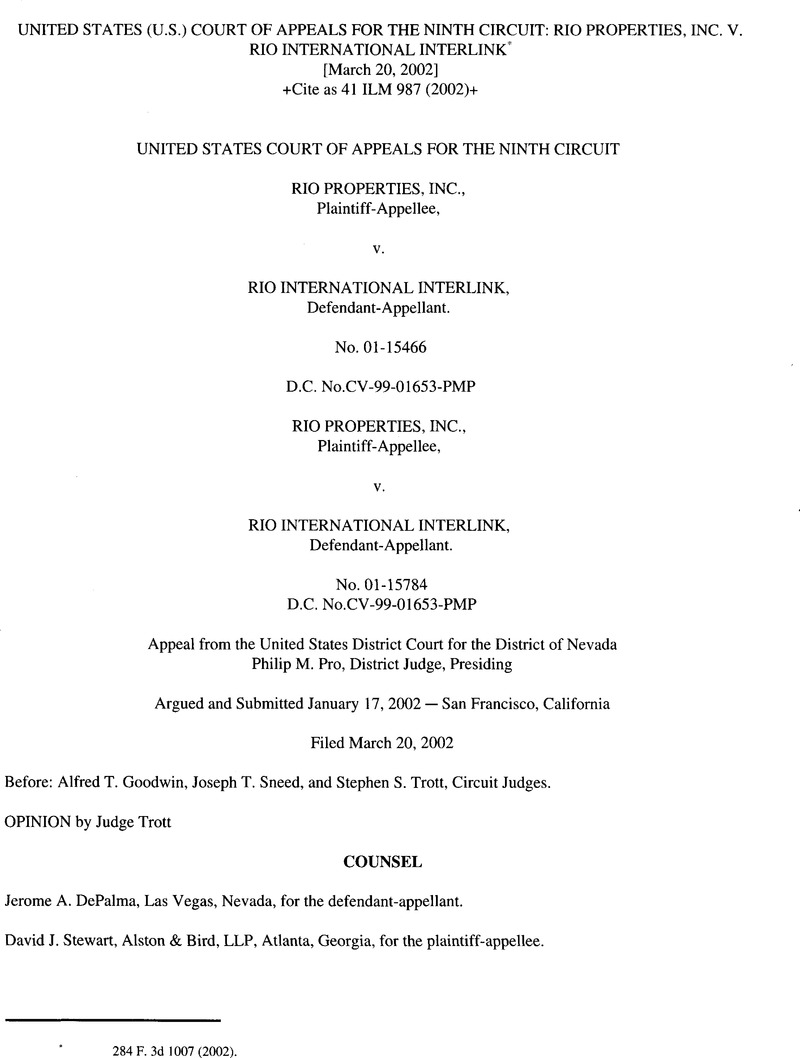No CrossRef data available.
Published online by Cambridge University Press: 18 May 2017

* 284 F. 3d 1007(2002).
1
Federal Rule of Civil Procedure 4(h) reads, in pertinent part: Service Upon Corporations and Associations. Unless otherwise provided by federal law, service upon a domestic or foreign corporation or upon a partnership or other unincorporated association that is subject to suit under a common name, and from which a waiver of service has not been obtained and filed, shall be effected:
(1) …
(2) in a place not within any judicial district of the United States in any manner prescribed for individuals by subdivision (f) except personal delivery ….
2 Federal Rule of Civil Procedure 4(f) provides, in pertinent part:
Service Upon Individuals in a Foreign Country. Unless otherwise provided by federal law, service upon an individual from whom a waiver has not been obtained and filed … may be effected in a place not within any judicial district of the United States:
(1) by any internationally agreed means reasonably calculated to give notice, such as those means authorized by the Hague Convention …
(2) if there is no internationally agreed means of service or the applicable international agreement allows other means of service, provided that service is reasonably calculated to give notice: (A) in the manner prescribed by the law of the foreign country for service in that country in an action in any of its courts of general jurisdiction; or (B) as directed by the foreign authority in response to a letter rogatory or a letter of request; or (C) ….
(3) by other means not prohibited by international agreement as may be directed by the court.
3 Rule 4(f)(3) was derived from its predecessor, Federal Rule of Civil Procedure 4(i)(l)(E), which provided for alternative service of process in a foreign country “by order of the court.“
4 A federal court would be prohibited from issuing a Rule 4(f)(3) order in contravention of an international agreement, including the Hague Convention referenced in Rule 4(f)(l). The parties agree, however, that the Hague Convention does not apply in this case because Costa Rica is not a signatory.
5 The Graval Court quoted the advisory committee notes for Rule 4(f)(2) as follows: Service by methods that would violate foreign law is not generally authorized. Subparagraphs (A) [which provides for service in the manner prescribed by the foreign law] and (B) [which provides for service as directed by the foreign authority in response to a letter rogatory or letter of request] prescribe the more appropriate methods for conforming to local practice or using local authority. Graval, 986 F. Supp. at 1330. Yet the Graval Court did not realize that this advisory committee note speaks only about subparagraphs (A) and (B) of Rule 4(f)(2). See Forum Fin. Group, 199 F.R.D. at 24 n.3. The advisory committee notes pertaining to Rule 4(f)(3) suggest no such limitation.
6 As of December 1,2001, amended Federal Rules of Civil Procedure 5(b)(2)(D) and 5(b)(3) permit service of process by email in certain circumstances: Service under Rule 5(a) is made by: D) Delivering a copy by any other means, including electronic means, consented to in writing by the person served. Service by electronic means is complete on transmission; service by other consented means is complete when the person making service delivers the copy to the agency designated to make delivery. If authorized by local rule, a party may make service under this sub-paragraph (D) through the court's transmission facilities. (3) Service by electronic means under Rule 5(b)(2)(D) is not effective if the party making service learns that the attempted service did not reach the person to be served.
7 The term “Electronic Signature” is defined in 15 U.S.C. § 7006 as: [A]n electronic sound, symbol, or process, attached to or logically associated with a contract or other record and executed or adopted by a person with the intent to sign the record.
8 Notably, RII does not argue that it did not receive notice of the present lawsuit or that such notice was incomplete, delayed or in any way prejudicial to its ability to respond effectively and in a timely manner.
9 In its reply brief, RII asserts that “RIO … fails to advise the Court the allegation [that RII had contacts with Nevada ] … was found to be false through discovery.” Apparently, RII answered several discovery interrogatories disclaiming any contact whatsoever with Nevada. If this case had proceeded, RIO would have borne the burden of proving facts sufficient to establish personal jurisdiction, including the extent to RII's Nevada business contacts. On the face of the complaint, however, RIO easily established aprima facie showing that RII purposefully availed itself of the Nevada forum.
10 Federal Rule of Civil Procedure 37(b)(2)(C) provides in pertinent part:
Sanctions by Court in Which Action is Pending. If a party … fails to obey an order to provide or permit discovery … the court in which the action is pending may make such orders in regard to the failure as are just, and among others the following:
(C) An order striking out pleadings or parts thereof, or staying further proceedings until the order is obeyed, or dismissing the action or proceeding or any part thereof, or rendering a judgment by default against the disobedient party[.]